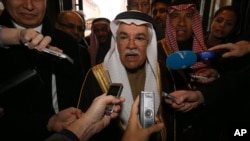OPEC oil output has risen in November from the previous month, a Reuters survey found on Monday, led by a rebound in Iraqi exports after bad weather had temporarily halted supply growth from the group's second-largest producer.
The increase indicates the Organization of the Petroleum Exporting Countries is again pumping close to a record high as Saudi Arabia and other big producers focus on market share. OPEC meets this week to review the policy, with no change expected.
OPEC supply has risen in November to 31.77 million barrels per day (bpd) from 31.64 million in October, according to the survey, based on shipping data and information from sources at oil companies, OPEC and consultants.
The OPEC meeting on Friday comes almost a year after its historic decision, led by Saudi Arabia, to refuse to prop up prices. Oil has more than halved in 18 months due to persistent oversupply, but even those in OPEC who want a change in approach do not expect one.
"I am seeing that Saudi Arabia will not change its position," said an OPEC delegate from a non-Gulf country which favors supply restraint. "No favorable outcome will be reached at the next meeting."
OPEC has boosted production by about 1.50 million bpd since its November 2014 policy shift. Output is not far below July's 31.88 million bpd, the highest since Reuters records began in 1997.
The biggest monthly rise in output has come from Iraq, the world's fastest growing source of supply growth this year.
Exports from Iraq's main outlet, its southern terminals, have risen in November to at least 3.06 million bpd and could top that and set a record if tankers currently waiting depart before Tuesday, according to loading data and industry sources.
Exports from Iraq's north by the Kurdistan Regional Government via Ceyhan in Turkey have edged lower, while those by Iraq's State Oil Marketing Organization have remained zero for a second month, the survey found.
Data from Iraq's oil ministry showed oil exports rose to a decades-high average of 3.37 million bpd in November, with output at 3.66 million bpd.
An increase has also come from Saudi Arabia, sources in the survey said, as the kingdom sent more crude abroad and used more in refineries, outweighing a seasonal drop in usage in domestic power plants.
"November exports and refinery runs are up compared to October by more than direct burn was down," said one of the sources who tracks Saudi output. "So, supply to the market is up in November."
Saudi output, at 10.25 million bpd in this survey, is not far from the record high of 10.56 million bpd it pumped in June.
Output declined in OPEC's two West African producers, Angola and Nigeria, the survey found. Libyan output, which was already at a fraction of the pre-conflict rate, edged lower in November.
Supply from Iran, OPEC's second-largest producer until sanctions forced a cut in exports in 2012, stayed flat in November, the survey found. A lifting of sanctions on Iran has the potential to boost OPEC output further in 2016.








